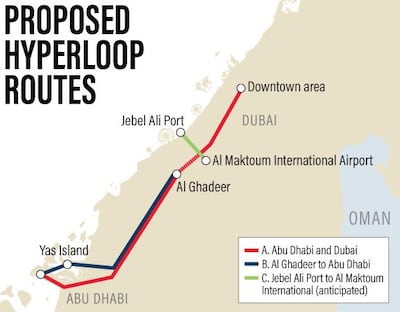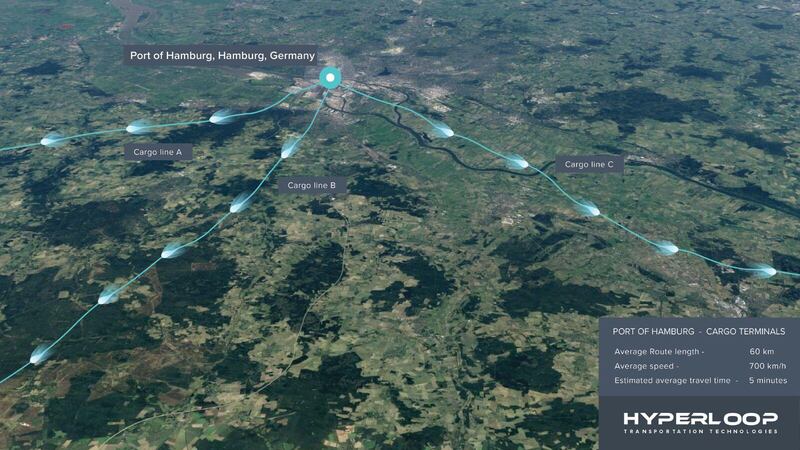One of the first high speed cargo systems in the world will be built in Germany when US company Hyperloop Transportation Technologies opens a new delivery route in Hamburg.
Three cargo lines are planned from the key port of Hamburg, with freight averaging speeds of 700km per hour along a 60km track.
Transport times for cargo arriving into Hamburg and then dispatched to other logistical hubs at the end of the line will take just five minutes.
If early trials are successful, thousands of heavy goods vehicles could be taken off the roads, reducing pollution and congestion around major cities.
The announcement on Wednesday comes days after rival company Virgin Hyperloop One revealed its version of the supersonic transport system will be a key feature of the US Pavilion at the Dubai Expo 2020.
A new joint venture company between Hyperloop TT, Hamburger Hafen und Logistik Aktiengesellschaft (HHLA) aims to bring the new technology to other ports, shipping and logistics companies around the world.
“Together with HHLA, this joint venture will be able to develop a commercial product that fills a missing need in the port industry,” said Bibop Gresta, chairman and co-founder of HyperloopTT.
“We have one of the best possible partners to bring this to market globally.”
Hyperloop TT has signed deals to operate a passenger route in Abu Dhabi, with a full scale prototype test track planned in Toulouse for spring 2019.
Construction on a 5km route in Abu Dhabi is due to begin next year.

An initial study on connecting a cargo-based hyperloop system from a container terminal to storage yards located further inland will launch the Hamburg project.
It aims to reduce congestion within the port and city area, lowering the area’s carbon footprint as a result.
A transfer station is to be constructed for testing on the new system, and will be located at the HHLA terminal in Hamburg.
It will include a 100 metre route, with special freight capsule and loading dock to show how the system will work when it is expanded on a larger scale.
No dates have been confirmed when the system will be fully operational.
“HHLA has a long history of innovation,” said Dirk Ahlborn, CEO and co-founder of Hyperloop TT.
“Years before we we're talking about self-driving vehicles, containers moved autonomously in Hamburg.
“Together, we will develop a complete system, that not only concentrates on speed and efficiency, but also takes into account the issues ports face in daily operation.”
Hyperloop technology is capable of reaching speeds up to 1,200km per hour, the speed of sound.
___________________
Read more:
[ Construction on Abu Dhabi's hyperloop to begin next summer ]
[ DP World reports drop in shipping container volumes due to 'market caution' ]
_____________________
In the late 1990s, HHLA was one of the first logistic companies to introduce GPS tracking and automated port operations.
In 2001, it incorporated self-driving vehicles into its daily terminal operation, a ground-breaking innovation for other ports around the world.
The company has a network of container terminals in Hamburg, Odessa in the Ukraine and Tallinn in Estonia.
“With the Hyperloop transport system, HHLA is pursuing the goal of developing an additional component of efficient logistic mobility solutions in Germany,” said Angela Titzrath, chairwoman of HHLA’s executive board.
“As a gateway to the future, we want to employ innovative approaches to make a contribution towards relieving the strain on the transport infrastructure in and around the Port of Hamburg and to use the capacities of our terminal facilities in an even more efficient way.”







